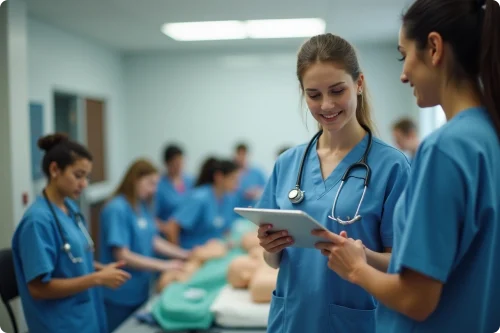Elevating Nursing Education with ERP LMS Solutions for Colleges
Introduction
Nursing is not just another academic field—it is a profession that requires precision, compassion, and hands-on expertise. To prepare students for such a demanding career, nursing colleges need to deliver more than just lectures. They must provide structured academic learning, practical training in labs, and extensive clinical exposure in hospitals. Unfortunately, many colleges struggle with outdated administrative practices—manual attendance registers, paper-based exam systems, and fragmented communication channels. This slows down efficiency and impacts the quality of education. By unifying academic and administrative processes, it ensures a smooth flow of operations and gives students the holistic learning experience they deserve.
1. Enriching Academic Learning
Nursing education thrives when students have access to flexible, engaging, and well-structured learning experiences. ERP LMS enhances academic delivery with digital classrooms, e-learning modules, online quizzes, and multimedia content. Faculty can share lecture notes, clinical guidelines, and case studies online, ensuring students always have access to updated materials. Automated attendance, grading, and assignment submissions reduce manual workload, allowing faculty to focus on pedagogy and mentorship. Additionally, ERP LMS supports Outcome-Based Education (OBE), ensuring that learning outcomes align with nursing council standards and healthcare industry requirements. By digitizing academic workflows, ERP LMS helps nursing colleges deliver higher-quality education with greater consistency and efficiency.
2. Seamless Clinical Training Integration
Clinical practice is the backbone of nursing education. ERP LMS bridges the gap between classroom teaching and real-world practice by managing clinical rotations, practical sessions, and internship records. Students can log their clinical activities, track progress, and receive structured evaluations from faculty. The system also helps administrators plan hospital tie-ups, schedule practical sessions, and document compliance with accreditation requirements. This structured integration ensures students gain hands-on exposure to real-world healthcare environments, building their confidence and clinical competence. By digitizing practical and clinical learning, ERP LMS ensures nursing colleges maintain high academic and professional training standards.
3. Administrative Efficiency and Transparency
Managing admissions, fee collection, faculty data, and compliance reporting can be overwhelming for nursing colleges. ERP LMS simplifies administration with automated admission portals, online fee management, faculty records, and accreditation-ready reports. Administrators gain access to real-time dashboards for decision-making, helping them track institutional performance and resource utilization effectively. With all operations integrated into one platform, the system minimizes manual errors and paperwork while increasing transparency across departments. For nursing colleges, this administrative efficiency ensures smooth campus operations and creates an environment where both faculty and students can thrive without operational bottlenecks.
4. Empowering Faculty and Mentorship
Faculty play a crucial role in shaping future nurses, and ERP LMS equips them with the right tools to do so effectively. With access to teaching analytics, student performance dashboards, and mentorship modules, faculty can provide personalized guidance. Early identification of weak students and timely interventions help improve learning outcomes. The system also supports research collaboration, lesson planning, and workload tracking. By empowering faculty with technology-driven teaching and mentoring tools, ERP LMS ensures that nursing colleges can build stronger academic foundations and support holistic student development.
5. Data-Driven Insights for Continuous Improvement
ERP LMS provides analytics and reports that drive continuous improvement in nursing education. These insights support better academic planning, accreditation readiness, and institutional growth strategies. Data-driven reports also ensure compliance with nursing councils and regulatory bodies. By turning data into actionable strategies, ERP LMS helps nursing colleges evolve continuously, improving academic quality, operational efficiency, and student satisfaction.
Why Nursing Colleges Need ERP LMS?
Complex Scheduling Challenges
Coordinating classes, labs, and hospital postings without overlap is difficult. Students often miss important clinical hours due to poor planning.Continuous Evaluation Requirements
Nursing students undergo frequent assessments—practical, theoretical, and clinical. Manual tracking often leads to errors or delays.Accreditation and Compliance
Nursing councils require precise data about student attendance, hospital hours, and academic performance. Without a digital system, audits and inspections become stressful.Resource Allocation Issues
Labs, libraries, and hospital tie-ups must be managed effectively. Manual methods waste time and resources.
Features of ERP LMS Tailored for Nursing Colleges
1. Clinical Training Management
Assign hospital rotations systematically.
Record feedback from supervisors instantly.
Track clinical hours completed by each student.
2. Content Management System (CMS)
Share lecture notes, medical guidelines, and case studies.
Provide access to research articles and video tutorials.
3. Student Progress Dashboards
Each student gets a personalized dashboard.
Faculty can identify struggling students early and provide support.
4. Examination Management
Create online or offline exams.
Automate grading and generate instant results.
Reduce delays in publishing outcomes.
Benefits Across the Institution
For Students
Transparent view of academics and clinical schedules.
Access to e-resources and assignments at any time.
Real-time progress reports for self-evaluation.
For Faculty
Simplified exam creation and grading.
Digital teaching tools for better engagement.
Reduced time spent on administrative tasks.
For Administrators
Centralized control of academics and training.
Quick generation of reports for audits.
Enhanced efficiency and cost savings.
Real-World Example
Imagine a nursing college where students juggle between classroom lectures in the morning, lab sessions in the afternoon, and clinical postings at partner hospitals in the evening. Without ERP LMS, schedules clash, attendance is mismanaged, and reporting becomes chaotic.
With vmedulife ERP LMS, administrators can generate schedules that avoid conflicts, students receive mobile notifications of their clinical postings, and faculty can mark attendance directly through the portal—even at hospital sites.
Conclusion
An ERP LMS for Nursing Colleges is not just a management system—it’s the backbone of efficient nursing education. By ensuring clarity in schedules, transparency in performance, and compliance with regulatory requirements, vmedulife ERP LMS creates an environment where students focus on learning and faculty on teaching.

